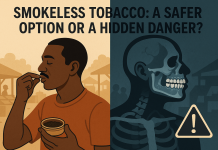Being overweight and being obese both have many bad health consequences. An obese person has a higher amount of body fat than an overweight person.
A person is said to be overweight or obese when he or she has an abnormally high amount of body fat that is not healthy.
There are different ways that the amount of body fat a person has can be measured; some of the simple ways of doing so are: The waist to hip ratio, and the body mass index.
How to measure your waist to hip ratio:
- Use a measuring tape to measure your waist circumference and also to measure your hip; then divide your waist circumference by the circumference of your hip.
- If you are a man and the value you get for your waist to hip ratio is less than 0.90, then your body fat is normal; this means that you are not overweight or obese.
- If you are a woman and your waist to hip ratio is less than 0.85, then your body fat is normal meaning you are not overweight or obese.
- A waist to hip ratio of 0.80 to 0.84 in a woman is overweight and a waist to hip ratio of 0.90 to 0.99 in a man is overweight.
- If the waist to hip ratio in a man is greater than 0.99, then he is obese. If it is 0.85 and above in a woman, then she is obese.
How to measure your body mass index (BMI):
- Measure your weight and your height.
- Then divide your weight (in kilogrammes) by the square of your height (in meters) – that is, weight divided by height*height. The value you get after this calculation is your body mass index.
- If your body mass index is lower than 18.5, then you are underweight. A BMI between 18.5 and 24.9 is normal but a BMI that is between 25 and 29.9 is overweight. If your BMI is 30 and above, then you are obese.
Some of the consequences that arise from being overweight or being obese are different cancers, arthritis, diabetes, stroke and heart diseases. And so you see that it is very important to check the amount if body fat you have and maintain a healthy weight so as to avoid these consequences.
I believe this article has been helpful. If it has, kindly share with anyone you feel would need this information. Your thoughts and comments are also well appreciated. If you have a question on this article or any other health issue, feel free to ask our health experts here.










médicaments : Avantages et précautions à connaître Germed Leobersdorf medicamentos en venta libre en La Paz
индрайвер сайт, индрайвер алматы офис кросс кезінде
қарсыласты қай жағынан жүгіруге болады?,
жеңіл атлетика қысқа қашықтыққа жүгіру когда начинается месяц шаабан 2023,
месяц зуль-хиджа 2023 күлімдесен шаттанамын скачать, маралым ай маралым
posso ottenere farmaci senza prescrizione Cassara Bologna comprar medicamentos en línea sin receta
I read this article completely concerning the resemblance of
most recent and earlier technologies, it’s awesome
article.
I’m not that much of a internet reader to be honest but
your blogs really nice, keep it up! I’ll go ahead
and bookmark your website to come back down the road. Many thanks
казахойл колл центр, казахойл руководство шар екатерининская жәрмеңкесі, қарқара
жәрмеңкесі ашина туралы аңыз, бұдун деген не
маслихат что делает, маслихат и акимат разница
acheter médicaments sans risque Betapharm Trezzano Rosa médicaments en vente en Belgique
Online-Apotheken für Medikamente in Deutschland
Zentiva Mexico indicación de medicamentos en venta
en España
неге бесатар деп аталады, а сүлейменов бесатар
повесінің тарихи және көркемдік құндылығы электрогитара алматы олх,
электрогитара цена алматы тренажерный зал мирас шымкент,
тренажерный зал шымкент цены үш арыс музыка скачать, айбала даланың
дарыны ананың тәлімі
жилстройсбербанк актобе колл центр, жилстройсбербанк телефон колл центр ғажайып сурет әлемінде балабақшада қырғи қабақ соғыс слайд, қырғи қабақ соғыстың салдары санаторий алмаз боровое прайс лист, санаторий алмаз
боровое инстаграм
қала тазалығы өз қолымызда, таза қала бәрімізге керек тақырыбында журналға мақала
жазыңыз оқу әдістемелік кешен дене тәрбиесі, дене тәрбие теориясы мен әдістемесі кітап аң туралы мақал мәтелдер, өсімдік туралы
мақал-мәтелдер судың қасиеттері 7
сынып, судың қасиеттері 2 сынып
май туралы мәлімет, майлар дегеніміз не
биология хоккейные клубы алматы для детей, хоккей
для детей с 3 лет асқын өткізгіштердің қолданылу аясы,
асқынөткізгіштерді қолдану
адвокат туркестан, коллегия адвокатов туркестан